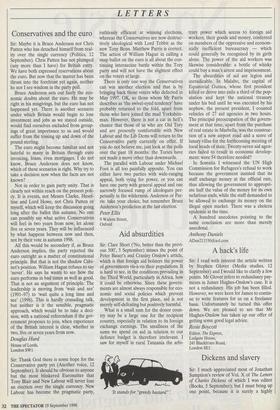LETTERS Conservatives and the euro
Sir: Maybe it is Bruce Anderson not Chris Patten who has detached himself from real- ity over the single currency (Politics, 12 September). Chris Patten has not plumped (any more than I have) for British entry. We have both expressed reservations about the euro. But now that the matter has been thrust into the forefront yet again, neither he nor I see wisdom in the party poll.
Bruce Anderson sets out fairly the eco- nomic doubts about the euro. He may be right in his misgivings, but the euro has not happened yet. There is another scenario under which Britain would begin to lose investment and jobs as we stayed outside, would find ourselves excluded from group- ings of great importance to us and would suffer from the tossing up and down of the pound sterling.
The euro might become familiar and not hateful to many in Britain through euro invoicing, loans, even mortgages. I do not know, Bruce Anderson does not know, which of these scenarios is right. Why try to take a decision now when the facts are not known?
Not in order to gain party unity. That is clearly not within reach on the present poli- cy. It is events, not Messrs Clarke, Hesel- tine and Lord Howe, not Chris Patten or myself, which will keep the discussion going long after the ballot this autumn. No one can possibly say what active Conservatives will feel in two years from now, let alone five or seven years. They will be influenced by what happens between now and then, not by their vote in autumn 1998.
All this would be secondary if, as Bruce Anderson implies, the party rejected the euro outright as a matter of constitutional principle. But that is not the shadow Cabi- net's position. William Hague refuses to say `never'. He says he wants to see how the euro performs in bad times as well as good. That is not an argument of principle. The leadership is moving from 'wait and see' (1991-97) to 'wait quite a long time and see' (1998). This is hardly crusading talk, but neither is it the sensible, pragmatic approach, which would be to take a deci- sion, with a national referendum if the gov- ernment proposes to join, when experience of the British interest is clear, whether in two, five or seven years from now.
Douglas Hurd House of Lords, London SW1










































































 Previous page
Previous page